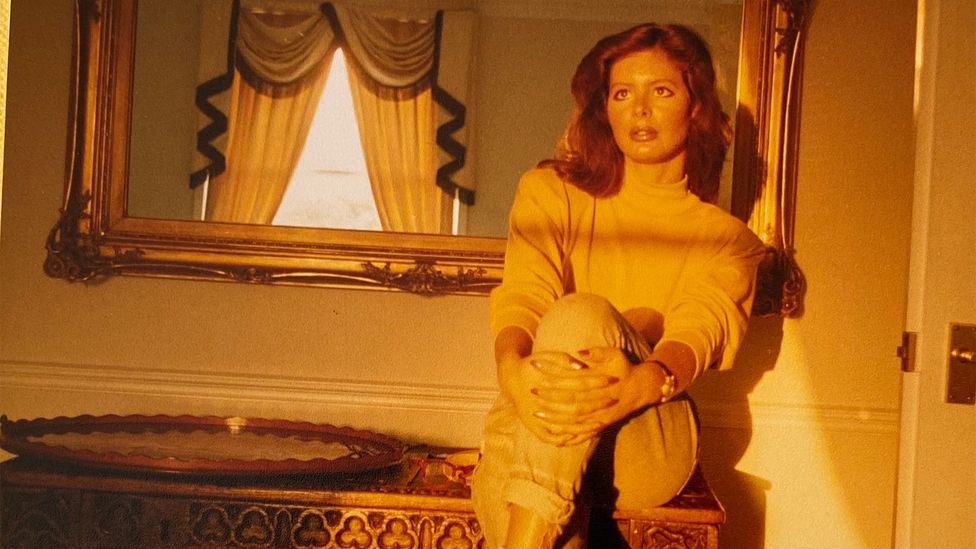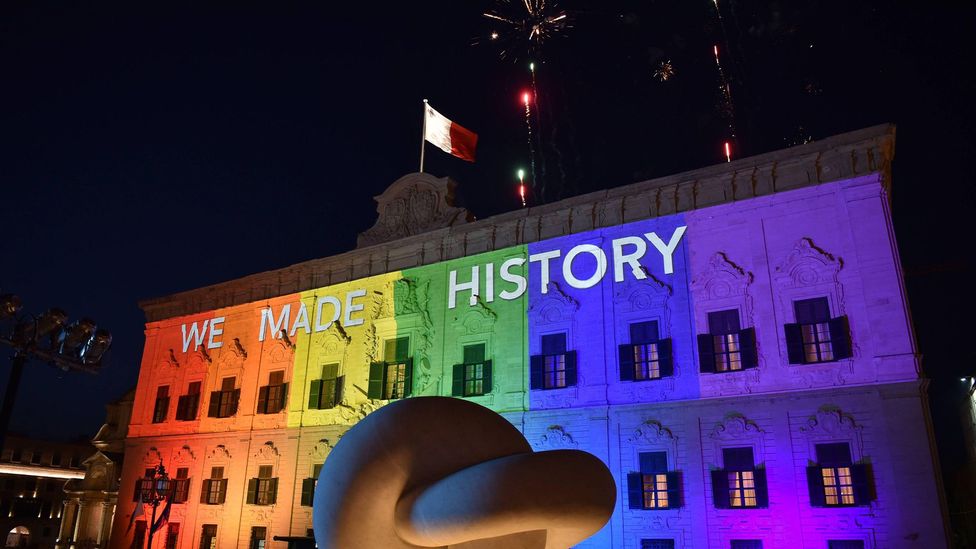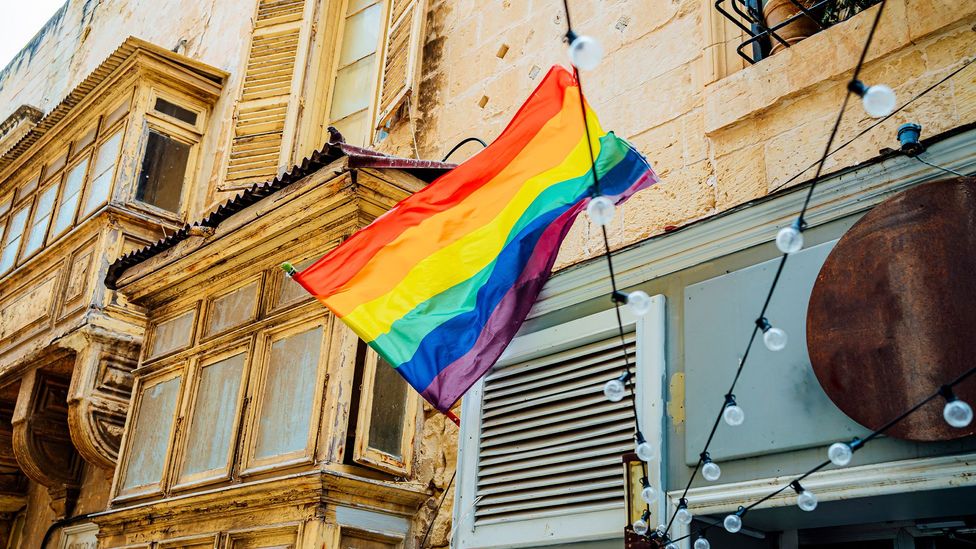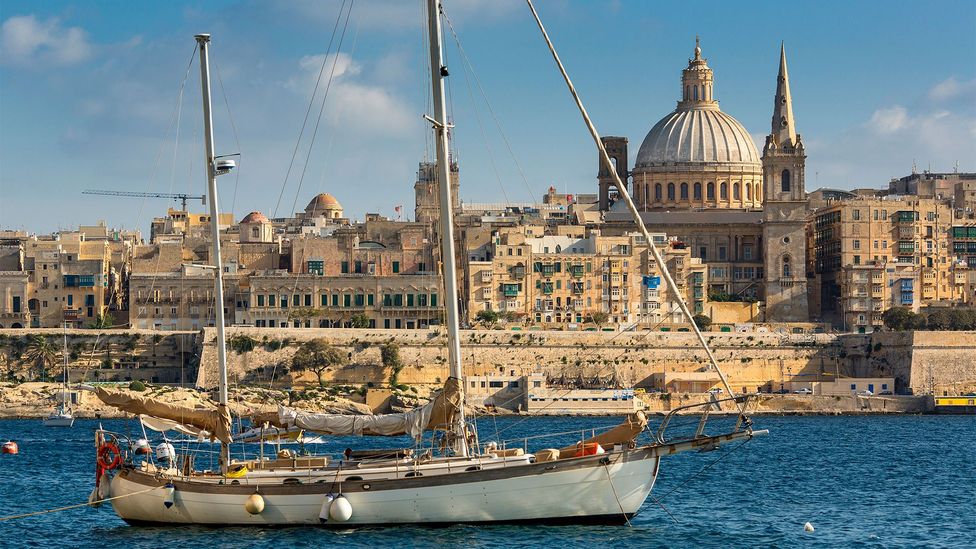It was a sweltering afternoon at Balluta Bay sometime in the late 1990s. Eager young journalist Ramona Depares was celebrating her first job at a local magazine at the City of London, one of Malta's oldest seafront bars, when a woman walked in. "Everyone stopped talking, openly staring," Depares said. "I remember she was wearing her iconic, massive black hat and a slinky black pantsuit – this was midweek, mid-afternoon, when everyone else was in flip flops. But it wasn't only about her clothes, it was her aura. She behaved like royalty. It was difficult not to be entranced."
This mysterious figure was international Maltese model and trans pioneer Katya Saunders, known to friends as Kaka. As Depares would soon learn, Saunders' life was as compelling as her glamorous career: in the 1970s, she moved to London and transitioned; while in the 1980s she was pictured in Vogue on the arm of Karl Lagerfeld, did photoshoots in New York and modelled for fashion designers Charles & Ron, who still own a store in the Maltese capital Valletta. Rumour had it she'd even hung out with David Bowie and Mick Jagger.
After an introduction, Depares and Saunders started chatting. "I asked whether she would give me an interview," said Depares. "And for years she played cat and mouse with me for this blessed interview, despite bumping into her at parties or fashion shows. She said she'd prefer to have her memoirs published instead."
Eventually Saunders disappeared from public life, having "fallen upon hard times", as Depares put it. Fast-forward to 2019 and the journalist was in the Times of Malta's office when news of her death broke. "I wrote her tribute thinking, well, at least she'd be happy to know that her death made waves across the Maltese media." Depares pictured her "giggling away, enjoying the commotion that she was once again causing".

In many ways, Saunders helped jump-start Malta's culture of LGBTQ+ acceptance (Credit: MGRM)
Since then, Saunders' trailblazing life as one of Malta's first openly transgender public personas has been reappraised on an island that's seen remarkable changes in the last two decades. One of only five nations in the world to have made LGBTQ+ rights equal at a constitutional level, it has held first place for eight years on the ILGA-Europe Rainbow Index, which ranks countries on LGBTQ+ equality. After first visiting Valletta's hilly streets half a decade ago, I've been intrigued by this tiny island nation's unlikely rise as one of the world's most tolerant places.
To examine how this happened, let's start by rewinding to the years after Saunders' birth in 1957. In 1964, Malta achieved independence after more than 150 years of British rule. The Brits had criminalised male same-sex relations, but as a republic, Malta legalised same-sex activity in 1973, with an age of consent of 16, equal to heterosexual sex. In 2001, the creation of the lobbying group Malta Gay Rights Movement (MGRM) helped usher in Malta's inaugural Pride March in 2004, as well as a national gay helpline. The pace quickened in the next decade: Malta was the first country in the EU to ban conversion therapy in 2016, when same-sex marriage was also passed, and the first European state to add gender identity to its constitution as a protected category.
What was Malta's first Pride March like 20 years ago? "Not a big affair," said MGRM's Joe Grima. "It attracted between 50 and 100 people, whereas by [2023's] EuroPride, 38,000 attended the march and concert headlined by Christina Aguilera. We could celebrate how far we came. The laws that safeguard equal rights are now a normal aspect of everyday life in Malta."
These laws were not in place for young Saunders or for other LGBTQ+ people of her era, however. As a result, the MGRM and Malta Council decided to celebrate her legacy by commissioning Depares to write the book Katya: Easy on the Tonic (a nod to Saunders' favourite catchphrase), and curating exhibitions featuring her clothes, portraits and accessories at galleries in Valletta, including one at Valletta's historic cultural hub Spazju Kreattiv (view the online archive here).

Malta has ranked first on the ILGA-Europe Rainbow Index for eight years (Credit: Imago/Alamy)
Another Saunders exhibit (which closed in 2023) was curated by multi-disciplinary artists Romeo Roxman Gatt and Charlie Cauchi. The duo also founded Malta's only LGBTQ+ gallery Rosa Kwir in Balzan – a must for visitors – which showcases stories from the community and "challenges the norms and stereotypes", said Cauchi. For inspiration, they looked deep into Malta's queer history – and discovered a fascinating tale predating Saunders' by two centuries. "We named the gallery Rosa Kwir after Rosa Mifsud, an intersex teenager [from the town of Luqa, Malta] who fought for his right to be recognised as male back in 1774," Cauchi said. "He faced a legal battle that involved a medical examination and a ruling by the Grand Master, who allowed him to wear only male clothes."
Despite welcoming Malta's recent advances in tolerance, she said that "patriarchal views and structures still persist, and Malta is the only EU country where abortion is illegal". Grima also offered an honest take. "To say it's perfect would be untrue. The scale of the EuroPride events attracted criticism and Maltese law does not yet include an Equality Act, which would ban discrimination in the workplace. Unlike most of Europe, both PrEP (the drug taken to prevent HIV infection) and PEP (taken after a possible exposure to HIV infection) are only available at a cost."
But the high ranking and recent progress mean there is much to be excited about for queer visitors. For starters, you can stay at the LGBTQ+-owned boutique hotel Senglea Suites in Birgu – a short and scenic ride on a gondola-style dghajsa from Valletta – or gay-owned Fauzia B&B, located in Hamrun just a few kilometres south-west of the capital. The island's biggest LGBTQ+ club is Michaelangelo in the buzzy nightlife district Paceville. Set over two floors, it's popular with a younger, mostly gay male crowd, while Maori is a relaxed seafront bar hosting fortnightly queer nights.
A comprehensive resource when you arrive on the islands is Gaymalta.com, which lists all LGBTQ+ events with a useful map of queer-owned businesses. Try to catch a Lollipop party, which takes place at rotating venues and calls itself "Malta's favourite queer night out since 2016" (the next one is a Rio Carnival-themed event on 9 Feb). And for that special meal with your partner, head to the Michelin-starred Noni, which pairs traditional Maltese dishes with contemporary cooking inside a 250-year-old former bakery.

This year marks the 20th anniversary of Malta's first Pride March (Credit: LordHenriVoton/Getty Images)
Other essential stops on the queer trail include the aforementioned Charles & Ron (the couple married after being together 25 years when Malta brought in civil partnerships in 2014), which is the only LGBTQ+-owned fashion store in Malta; and the quirky Souvenirs That Don't Suck, which has stores in both Sliema and Valletta, selling, among other items, a popular range of queer T-shirts. In the north of the island, the Malta Chocolate Factory hosts LGBTQ meet-ups, while the Rainbow Library, Malta's first LGBTQ+ library, contains around 300 books from queer classics to zines (contact MGRM before you visit). Here, of course, you'll find Saunders' biography.
All in all, it's impressive progress for a country that also happens to be 94% Catholic. "But without someone like Katya Saunders," said Depares, "the road to awareness would have been much longer."
---
Join more than three million BBC Travel fans by liking us on Facebook, or follow us on Twitter and Instagram.
If you liked this story, sign up for The Essential List newsletter – a handpicked selection of features, videos and can't-miss news delivered to your inbox every Friday.
